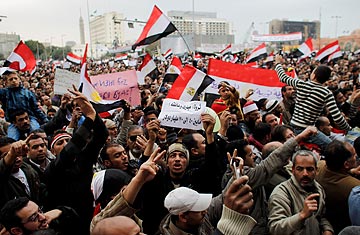
Egyptian antigovernment protesters in Cairo's Tahrir Square, the center of demonstrations, on Feb. 6, 2011
Have the protesters won or lost? In the chaotic, impassioned heart of Egypt's revolution, Cairo's Tahrir Square, that is now the question, as opposition politicians hunker down with government officials to craft a transition to democracy that could end President Hosni Mubarak's 30-year rule. The talks, which began Sunday morning, would have been unthinkable before the popular revolt exploded on the streets on Jan. 25, upturning this country's political future and rocking the entire Arab world. But equally, the intensive negotiations — which include Mubarak's longtime foes, the Muslim Brotherhood — appear to be stopping short of the protesters' key demand: for Mubarak to leave.
After meeting the Muslim Brotherhood and other opposition figures on Sunday, Egypt's Vice President Omar Suleiman agreed to discuss the main demands from the protesters and opposition figures, including Mohamed ElBaradei. Those include lifting censorship laws and ending Egypt's state-of-emergency regulations, which have been in force since Mubarak took power in 1981. A spokesman for the Brotherhood reportedly said the organization would not sell out the protesters and would not make separate deals with the regime.
The revolt is certainly far from over. And the square remains a place of tenuous security. Even on Sunday, perhaps the calmest of the 13 protest days yet, army troops opened fire from the roof of the heavily secured Egyptian Museum, which had been broken into earlier in the tumult. Just before 8 p.m., a group of about 50 men had apparently gathered on an overpass that has been a flash point for Mubarak loyalists. That was when gunfire broke out. Then a tank rumbled up the overpass and stopped where the men were gathered. Soldiers got out and moved them on. When this happened, the square was still packed with perhaps tens of thousands of people.
Behind the barbed-wire military cordon that encircles the square, the protesters are intensely divided over the backroom political maneuvers. Many are clearly buckling under fatigue after 13 days of little sleep and violent clashes with Mubarak supporters; others — in fact, most — believe that they are so tantalizingly close to victory that they should not accept anything less than Mubarak's ouster. The Egyptian leader said last Thursday that he would leave after presidential elections in September.
Waiting another seven months for Mubarak to leave seems unbearable to most protesters in Tahrir Square, many of whom have camped outdoors under rickety tents for days, have faced tear gas and gunfire and have seen comrades killed. "There is no political compromise we can see," says Omar Tag, 20, a student who has volunteered through the 13-day revolt to search the thousands passing through the cordon around the square; Tag was among dozens who slept overnight Sunday at the foot of about five military tanks, fearing that the military was preparing to storm the square in order to clear out the protesters. Throughout, the repetitive slogan chanted in the square has been "We won't leave, he [Mubarak] must leave."
For now, Mubarak's closest aides rule that out. In an interview on CNN's State of the Union on Sunday, Egypt's Prime Minister Ahmed Shafiq, who was appointed a week ago amid the fighting in Cairo's streets, said Mubarak would stay until September. "We are in bad need of the President to continue because that will be easier for us to conclude the mission we have," he said. "There is no need to change at this time ... [because] we are already changing all the things which need to be changed."
